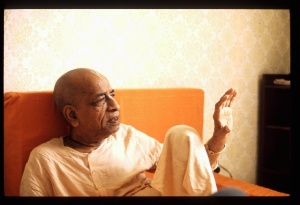CC Antya 3.105 (1975)

A.C. Bhaktivedanta Swami Prabhupada
TEXT 105
- veśyā-gaṇe kahe,--"ei vairāgī haridāsa
- tumi-saba kara ihāra vairāgya-dharma nāśa"
SYNONYMS
veśyā-gaṇe—unto the prostitutes; kahe—said; ei—this; vairāgī—mendicant; haridāsa—Haridāsa Ṭhākura; tumi-saba—all of you; kara—cause; ihāra—his; vairāgya-dharma—from the life of a mendicant; nāśa—deviation.
TRANSLATION
Rāmacandra Khān said to the prostitutes, "There is a mendicant named Haridāsa Ṭhākura. All of you devise a way to deviate him from his vows of austerity."
PURPORT
Devotional service is the path of vairāgya-vidyā (renunciation and knowledge). Haridāsa Ṭhākura was following this path, but Rāmacandra Khān planned to induce him to break his vows. Renunciation means renunciation of sensual pleasure, especially the pleasure of sex. Therefore a brahmacārī, sannyāsī or vānaprastha is strictly prohibited from having relationships with women. Haridāsa Ṭhākura was strictly renounced, and thus Rāmacandra Khān called for prostitutes because prostitutes know how to break a man's vow of celibacy by their feminine influence and thus pollute a mendicant or a person engaged in devotional life. It was impossible for Rāmacandra Khān to induce any other women to break Haridāsa Ṭhākura's vow, and therefore he called for prostitutes. Free mingling with women has never been possible in India, but for one who wanted to associate with society girls, they were available in a district of prostitutes. There were prostitutes in human society even in Lord Kṛṣṇa's time, for it is said that the prostitutes of Dvārakā City came forth to receive the Lord. Although they were prostitutes, they were also devotees of Kṛṣṇa.